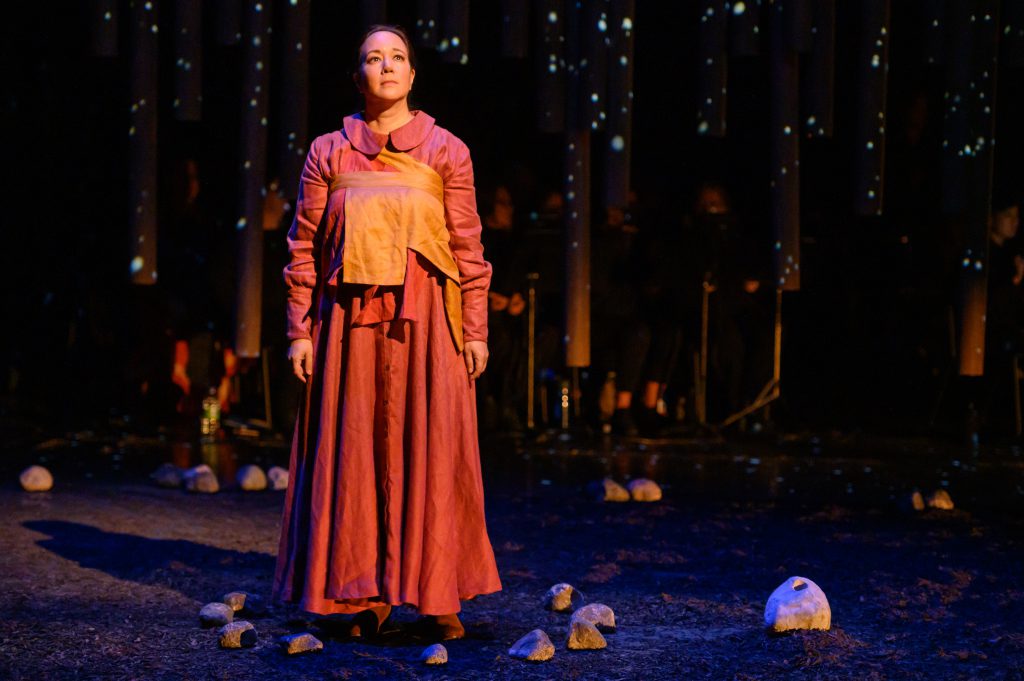There comes a moment in the pulsing ebb and flow of Shanawdithit, Tapestry Opera’s haunting parable of memory and transcendence currently on offer at the Imperial Oil Theatre, when composer Dean Burry’s acutely elemental soundscape is abruptly overwritten by a rush of insistent, almost Mozartian chamber values. The elaborate interlude, suitably stamped and embossed with discrete European harmony, quickly establishes, dominates for a time, and then is itself subsumed into the larger, still lingering organic score. The past, Burry’s music makes clear, will never vanish no matter how compelling the force of conquest. The power of the Indigenous presence is everlasting.
Some three years in the making, an intense collaborative process involving broad pan-Canadian First Nations artistic involvement, the Newfoundland-based tale of the Beothuk, hunted and harried into extinction by succeeding waves of British colonists, bursts to life on the Toronto indie stage, gripping, sensitive, inexpressibly powerful. Shanawdithit’s shining namesake, the last of her people, speaks her truth across the ages, her testament infused with strength and selfhood, indestructible, a messenger for our times.
Seen from the vantage point of opera history, Shanawdithit , impeccably through-composed with crisp, articulate libretto by Algonquin playwright Yvette Nolan, arguably fits more snugly into the realm of modernist music theatre/theatre-with-music than the more experiential, self-referencing contemporary canon. The influence of Benjamin Britten is unmistakeable as witnessed in Burry’s unfailingly fluid evocation of the environment, the narrative of vision and dream repeatedly at odds with brutal reality. Tides and rainstorms and the whisper of the stars fill the darkness. A desperate flight from certain death through snowy winter woods is chillingly revisited. Electronic sound design and visual effects may be distinctly 21st century, but the underlying composition, the vibrancy of Burry’s varied themes, the economy and sharpness of expression, instantly connect us to the realm of nature and spirit that is Shanawdithit’s sanctuary. Story becomes music becomes emotion. Opera at its most cathartic.
Somewhat astonishingly, given Burry’s remarkable two decades-old determination to set the familiar local Newfoundland saga re-encountered as a Master of Music student at Memorial University, Shanawdithit glows with freshness. A dynamic talented creative team sends the piece soaring, practiced skills and mature mise-en-scène blended with nimble can-do inventiveness.
Employing the Imperial Oil Theatre’s sweeping expanse of stage geography to great effect, co-directors Michael Mori and Nolan, resurfacing here in the role of resident dramaturge, transport us to the active centre of conflict and tension, occasional moments of static tableau glowingly captured. Drawing inspiration from century-old depictions of Beothuk-built caribou capture pens, designer Camellia Koo’s stark monoset, a monumental wall of naked logs, encircles and contains, simultaneously sheltering and threatening. Lighting designer Michelle Ramsay partnered by digital video projection specialist Cam Davis mesmerize with their stunningly luminous worlds on world of magic and menace.
Appearing as Shanawdithit, Kwagiulth and Stó:lō First Nations, English, Irish, Scottish mezzo-soprano Marion Newman invests her character with towering dignity and courage, her voice ascending on waves of pain, returning earthwards with flawless passaggio wrapping us in her humanity. Singing a last aria, Burry’s exquisitely heartrending I will soon walk out of this world, Shanawdithit prepares to exit her tortured life, Newman conveying her soul to a place of infinite serenity and quietude. An unforgettable performance of boundless passion and grace.
Inhabiting the role of wealthy St. John’s philanthropist, early Beothuk chronicler William Cormack, baritone Clarence Frazer boldly depicts the full measure of the man, charting his progress from starchy Georgian ethnographer to comprehending Indigenous ally. It is Cormack who conveys the full horror of Beothuk genocide to the white man’s world by encouraging Shanawdithit to capture her people’s shattered past in drawings. Duets with Newman tear at the heart. Recitatives and ariosos, numerous and impactful, are equally well sung, Frazer’s rolling timbre and appealing lack of reserve powering a succession of superbly articulated vignettes. A stain against God and science!, Cormack thunders to a handful of staid colonists gathered to hear him lecture. The marked hint of helplessness in Frazer’s tone, the ring of bitter alienation, Cormack’s implicit rage with self is palpable.
Assuming dual identities as members of both Beothuk and colonial communities, tenor Asitha Tennekoon and Ojibwe baritone Evan Korbut provide significant depth of added persona to Tapestry Opera’s searing 80-minute folktale. Tennekoon’s savage depiction of vicious racist magistrate and merchant John Peyton is nothing less than harrowing. Korbut’s layered portrayal of Attorney General James Simms, Shanawdithit’s appointed caregiver following Cormack’s return to Britain, hints at future empty government promises to care and protect Indigenous peoples.
Métis soprano Rebecca Cuddy appears as Shanawdithit’s universal descendant, Kwe. Mi’kmaq dancer Aria Evans contributes an assertive series of lithe solos also appearing as Shanawdithit’s murdered aunt, Demasduit. Inuk mezzo-soprano Deantha Edmunds sings Shanawdithit’s mother. The show of farflung generations communicating with one another through time, lives past, present and future crossing and recrossing, is deeply poignant.
Music director Rosemary Thomson leads an agile 11-player ensemble, strings, woodwinds, horn and percussion. Members of Toronto City Opera Chorus raise Burry’s stirring monophony virtually to the level of sacred chorale.
That Shanawdithit should succeed so memorably as drama, given the strength of the subject matter, is perhaps not surprising. But that it should do so with such an abundance of humility and lack of self-congratulation is quite remarkable. The process of collective remembrance is carefully kindled and with it the first faint glimmer of reconciliation. This is an opera of immense importance.
* * *
Above: Marion Newman as Shanawdithit. Photo by Dahlia Katz


